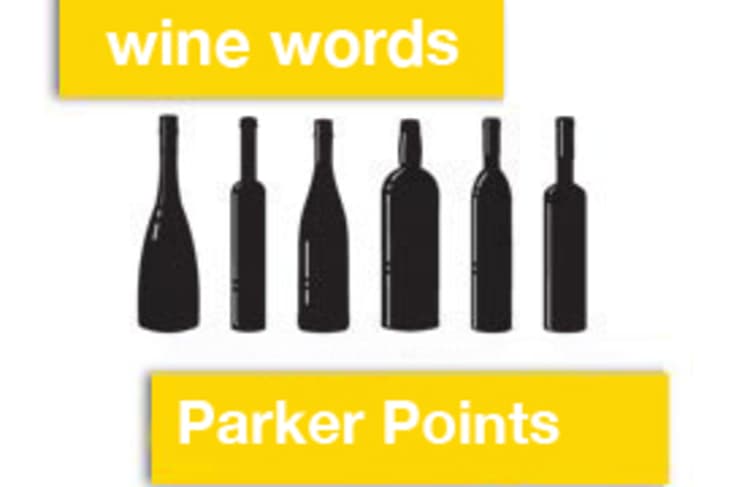Wine Words: Parker Points
Parker Points is a wine term that you hear bandied about quite a lot and often discussed critically. The term Parker Points refers to a score awarded to a wine by Robert M. Parker Jr., the most influential wine critic of the past 20-30 years.
Robert M. Parker Jr., whose influential newsletter is called The Wine Advocate (often abbreviated to WA on shelf talkers), uses a 100 point scale to rate wines.
How Parker’s Scoring System Works
According to The Wine Advocate website the scoring system works as follows:
- 96 – 100: An extraordinary wine of profound and complex character displaying all the attributes expected of a classic wine of its variety. Wines of this caliber are worth a special effort to find, purchase, and consume
- 90 – 95: An outstanding wine of exceptional complexity and character. In short, these are terrific wines.
- 80 – 89: A barely above average to very good wine displaying various degrees of finesse and flavor as well as character with no noticeable flaws.
- 70 – 79: An average wine with little distinction except that it is a soundly made. In essence, a straightforward, innocuous wine.
- 60 – 69: A below average wine containing noticeable deficiencies, such as excessive acidity and/or tannin, an absence of flavor, or possibly dirty aromas or flavors.
- 50 – 59: A wine deemed to be unacceptable
A Controversial Scoring System
The Parker’s scoring system is very controversial. Because of its significant international influence, it has created a world where ‘the higher the score, the higher a price a producer can charge for the wine’. Top scores means top prices.
The system has also come under attack because some believe that Robert Parker overly favors wines that are bigger, more powerful, more extracted, and by default, not very food friendly and overly alcoholic; and also that many wine producers deliberately craft wines that will be favorable to Parker’s palate.
Another area of controversy is that the Parker system has bred a generation of ‘lazy’ retailers who rely on the Parker score to sell wine and use Wine Advocate generated shelf-talkers rather than putting together personal tasting recommendations. Such retailers will argue that their customers only want the high-scoring wines and therefore it makes sense to use the scores.
However, the sad reality is that scores do work: scores sell wine. Wines with the highest ‘Parker Points’ are usually the most highly sought after wines, and the wines with the highest price tags.
The Possible Future for Parker Points
That said, there is definitely an emerging generation of free-thinking food and wine folk (retailers, sommeliers and wine drinkers etc.) who have the courage of their own convictions and do not blindly follow or rely on Parker Points to sell or buy wine. This is a much-needed generation that has the confidence and the passion to develop its own individual opinions.
Another clue to the possible waning of the Parker influence was the recent announcement that Robert Parker has sold his majority shareholding in The Wine Advocate to a group of Hong Kong based investors. Methinks a major shake-up and the re-defining of how wine is critiqued is around the corner.
Mary Gorman-McAdams, MW (Master of Wine), is a New York based wine educator, freelance writer and consultant. In 2012 she was honored as a Dame Chevalier de L’Ordre des Coteaux de Champagne
Previous Wine Words
• Wine Words: Brettanomyces
• Wine Words: Clarity
•
Wine Words: Color
• Wine Words: Complexity
•
•
Wine Words: Aromas
•
Wine Words: Alcohol
•
•
•
•
•
•
Wine Words: Sweetness
• Wine Words: Style
• Wine Words: Oak
• Wine Words: Clarity
• Wine Words: Extraction
•
•
• Wine Words: Reserva, Riserva, Reserve
• Wine Words: Quality
•
Wine Words: Vintage
•
•
Wine Words: Bordeaux Blend
•
•
• Wine Words: Champagne
•
•
• Wine Words: Malolactic Fermentation
• Wine Words: Cold Soak
• Wine Words: Fortified
• Wine Words: Contains Sulfites
•
• Wine Words: Old Vines
•
•
• Wine Words: Yeasts
•
Wine Words: Cuvée
• Wine Words: AVA
•
• Wine Words: Unfiltered
• Wine Words: Vintage Variation
(Image: Underlying image by Sadovnikova Olga/Shutterstock)
